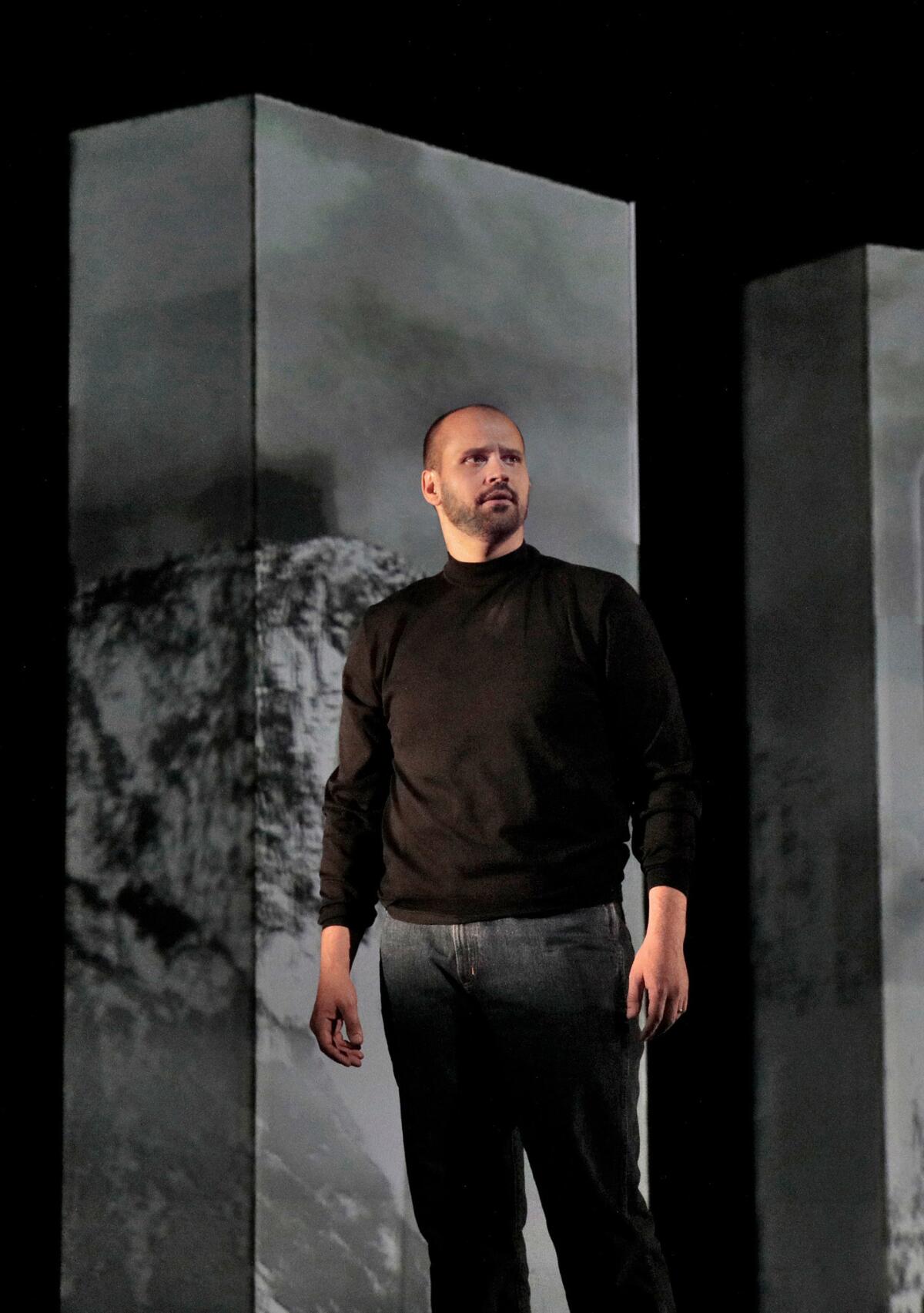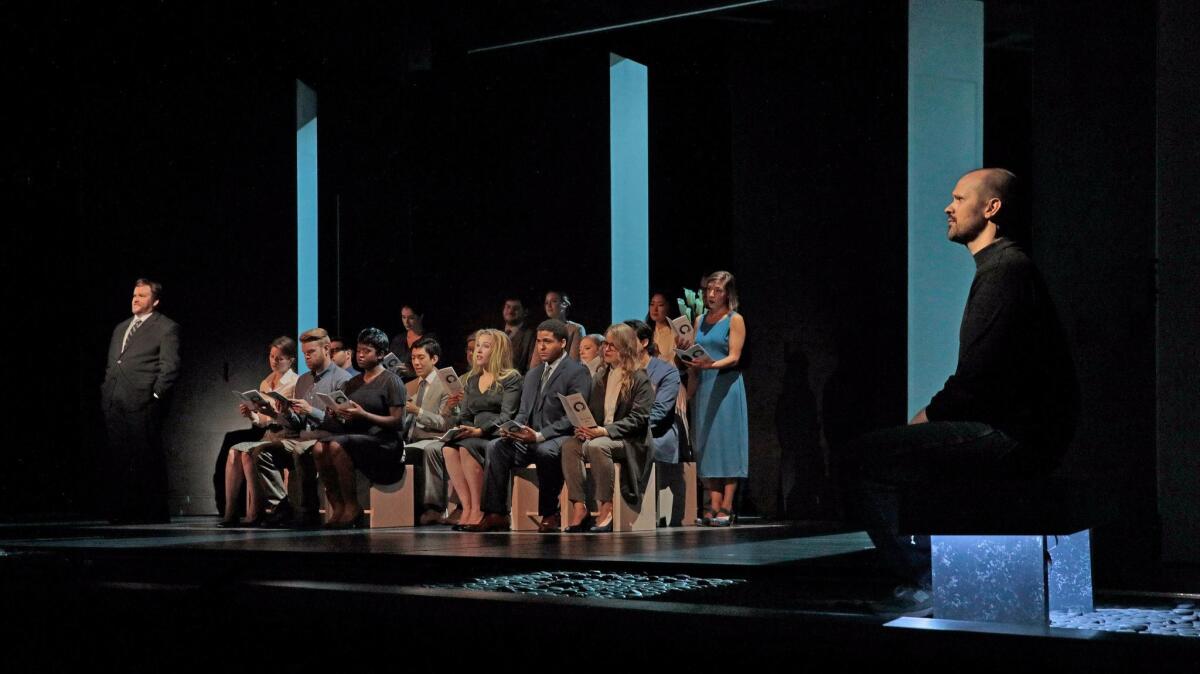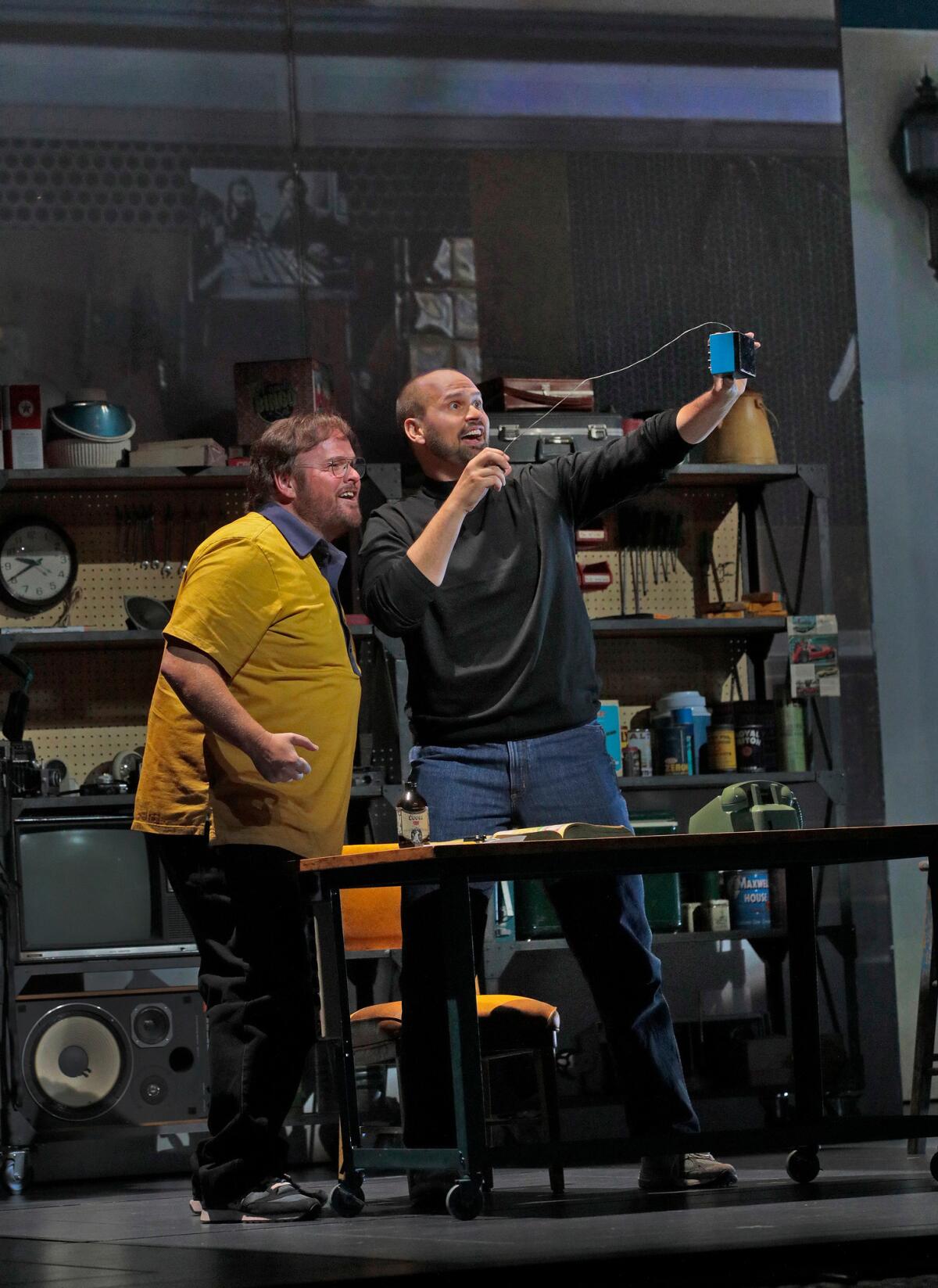Review: The man, the machine and now Steve Jobs, the opera
- Share via
Mason Bates’ “The (R)evolution of Steve Jobs” is an opera in search of angels. It treats the life of the
It means to leave us with the belief that a man may be a man and machine merely machine. There is goodness in both, it suggests, as long as we don’t get the two confused, which we usually do. The best line in Mark Campbell’s libretto comes at the end, during Job’s 2011 memorial. His wife, Laurene, notes that the second the service is over, for better or worse, everyone will reach for a phone.
Version 2.0 of Steve wouldn’t want that, she understands. “ ‘Please buy them,’ he’d say, ‘but don’t live your life on them.’ ”
“RSJ,” as the creators have taken to calling the opera in shorthand, is pretty much an opera for Apple addicts who reason they can still have a life outside their gadgets. That and the sanctifying of Jobs, while making a big deal that he’s not a saint, may explain why “RSJ,” which was given its premiere by Santa Fe Opera Saturday night, has been a big hit with the audience — six performances sold out, a seventh has been added and more are contemplated — but has thus far had a mixed, sometimes cynical, critical success. Both may be valid responses.

At the second performance Wednesday in Santa Fe’s glorious outdoor opera house, where performances begin during resplendent desert sunsets and “RSJ” was warmly received on a warm evening, I found it a winning opera.
It is true to Jobs in being slick. It is true to old-fashioned opera in being sentimental. It is true to Apple in Bates’ applying technology, combining electronica and frisky orchestral music and lyrical vocal lines, in as friendly a way as possible.
Just as the first iMac said hello when you turned it on, “The (R)evolution of Steve Jobs” says hello when you turn it on. It is an opera full of complex inner workings but simple on the surface, totally user-friendly.
Jobs family, friends and Apple had nothing to do with, and have demonstrated not the slightest interest in, the making of “RSJ,” which will be staged by the San Francisco Opera and Seattle Opera in coming seasons. Apple is never mentioned, the products are not named and the libretto has the usual disclaimer that it does not purport to depict actual events, beliefs of persons, etc. But, of course, it does — just as it drinks, musically and spiritually, the Apple Kool-Aid.
The central premise of the libretto is that the Zen Buddhist enso, the circle drawn in one or two brushstrokes as symbol of a mind freed of constraints, inspired both Jobs’ fervor for minimalist design and his lifelong devotion to Buddhism. The opera, which is a single 95-minute act in 18 scenes, continually circles around Jobs’ life. A key figure is his spiritual advisor, Buddhist monk Kobun Chino Otogawa.

Kobun’s job is to deal with Jobs’ extraordinary ego, which he does with marvelous wit and wisdom. Laurene’s job is to deal with her husband’s extraordinary ego, which she does with embracing humanity. Steve Wozniak’s job is to deal with his old friend’s all-embracing ego by reminding him of their early idealism.
And Jobs’ job is to confront his mortality. The strongest reason for this opera to be is to show that Jobs’ mania for control is ultimately that this supreme cleaner-up of messiness is trying to hide more than circuitry in his one-button machines.
Famous for impatience, callousness and making impossible demands, he is here impatient and callous with, and made impossible demands upon, himself. Having blocked his emotional growth, he must find a way to come to terms with his cancer, which he neglected, and face up to death. The apotheosis of “RSJ” is the master of communication learning how to communicate.
Bates’ score, for all its attempts at being revolutionary, does this in ordinary fashion. He is a master of electronica and sits among the orchestra working his MacBook. But he does little more than smoothly enhance orchestral sonorities, giving them added glitz.

Each character has his or her sound world. Electronic blips (computerish sampled sounds) along with moody or heroic chords represent Jobs. Asian music clichés, such as temple bowls and breathy flutes, are Kobun’s. Jazzy saxophones serve Woz, as do softer strings, the loving Laurene.
Jobs is a baritone (I kind of see him as a countertenor), which allows him to approach Wagnerian heroism at the end. If Edward Park’s capably sung Jobs lacks charisma, the opera doesn’t delve too deeply into him. You know he’s got his demons, but not what they are.
Sasha Cooke’s Laurene and Wei Wu’s Kobun, on the other hand, provide strong personalities on stage — these are compelling singers, and they get the most persuasive music. If they believe in Steve, maybe we should too. There isn’t much beneath the surface to Garrett Sorenson’s Woz beneath an inherent incorruptibility.
Where the opera lets down the most is in Kevin Newbury’s conventional production with its boxes moved around to make sets. Visually, sets and lighting do little to evoke Apple’s design elegance. Using the enso in place of the Apple logo makes the whole thing feel like its about a slightly creepy cult.
But the sound design is just fine, with conductor Michael Christie creating an unobjectionable balance between acoustical and electronic sounds and keeping the opera moving along.
“RSJ” is a heroic opera that wants you to believe its subject is just a man. I’m not sure that it convinces either way. There is simply not enough to it. But there is good music in it from a fashionable 40-year-old composer whose first opera reveals a genuine feeling for the theater.
ALSO
Gustavo Dudamel speaks out on Venezuela's constitution fight: ‘The present is the future’
The pitfalls and joys of taking a stand with music and with youngsters
Review: The Bowl is no Bayreuth. And with Wagner in Dudamel's defiant hands, that's not a bad thing
Review: ‘Sondheim on Sondheim’: A Broadway baby in symphonic clothes
The biggest entertainment stories
Get our big stories about Hollywood, film, television, music, arts, culture and more right in your inbox as soon as they publish.
You may occasionally receive promotional content from the Los Angeles Times.








